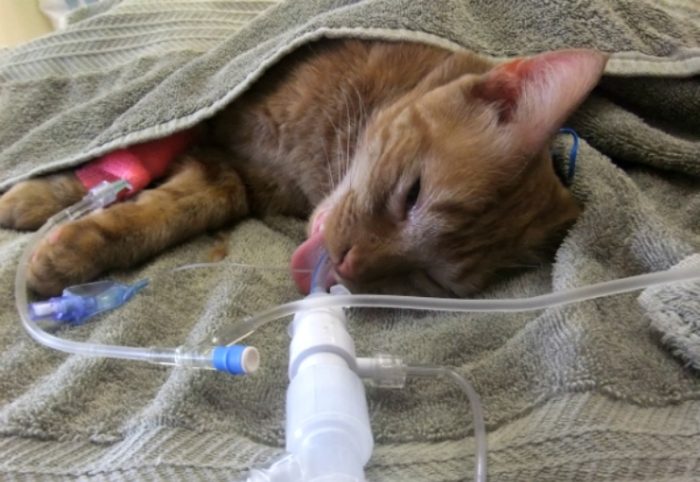Sneezing is a natural reflex action that allows humans to eject unwanted particles from the nasal cavity. The same can be said for the feline population, whatever causes the nerve endings in a kitty’s nasal passage to be irritated can also cause it to sneeze. This includes allergies, viruses, as well as foreign bodies such as grass seeds. Sneezing may not be a cause for alarm, but cat sneezing blood will definitely require a veterinary exam, diagnosis, and possible treatment options to curtail the effect of whatever is ailing the kitty.
Table of Contents
Possible Causes Of Cat Sneezing Blood
A lot of factors may be responsible for sneezing blood in kitties; some are common while others are rare. Often, sneezing out blood is associated with a plethora of other symptoms, which helps in suggesting the root cause. Below are some possible causes of cat sneezing blood.
Severe Colds/flu
When a cat is ailed by the flu or cold, the inside of its nasal passage can accumulate plenty of nasal fluid, which goes on to irritate the lining, and may result in sneezing blood. Before bringing treatment options for the underlying flu or cold, the veterinarian may suggest clearing out the nostrils. If other flu/cold-like symptoms like watery discharge from both the nose and eyes, loss of appetite, coughing, and sneezing of blood are observed, “cold” may be the cause. However, you should still call on the vet to rule out more serious causes and get proper treatment for your feline friend.
Allergies
Just like cold, allergies can also lead to a build-up of fluids, resulting in sneezing blood for a similar reason. When your feline companion suddenly starts sneezing blood, allergy may be the culprit. If you observe that the sneezing started after you made a change to your kitty’s environment like switching to another cleaning product for the house or changing the cat’s litter, just going back to what used to be there could be enough for you to stop it.
Some allergies are seasonal and can be caused by dust or pollen in the air – this may also lead to cat sneezing blood. A vet will prescribe the right treatment for it, or you may decide to go with some home remedies which are equally effective.
Dental Problems
A cat can develop dental problems like tooth abscesses, which can give rise to infections. When this infection spreads to the kitty’s nasal region, it can result in bloody sneezing. This may be rare, but it occurs occasionally; it could be the case if you observe that your feline has other dental symptoms like painful jaw or low appetite. Never allow dental problems to become serious, regular vet examinations will fish them out; this should be taken more seriously if your cat is an older pet.
The Presence Of Foreign Body
Foreign bodies are among the most common reasons cats sneeze out blood. It can be a piece of food or a blade of grass stuck in the feline’s nasal passage. This type of sneezing can come suddenly or develop slowly as the offending foreign piece moves down the respiratory system. No other symptom may occur except perhaps irritation.
Trauma
When a kitty suffers some form of trauma inside or around the nose, it can result in bleeding in the nasal passage. This is more likely to occur with outdoor cats that can engage in fights with other cats without your knowledge.
Blood Problem
A cat sneezing blood may also be an indication of a blood problem like high blood pressure or anemia. Blood problems can also be indicated by other symptoms like bloody poop, lethargy, vomiting, and a change in appetite. Rat poison can also cause blood problems. Rat poison can lead to a blood clotting problem, thus you have to be very careful if your feline has had access to infected rats or rat poison. If not treated immediately, rodenticide poisoning is usually fatal.
Tumour
Bloody sneezing can occur in a cat that has a tumor in the nose or around the nose. The only other symptom that may accompany this might be facial swelling when the tumor gets to a significant size.
What To Do If Your Cat Is Sneezing Blood
When your feline friend is sneezing blood at a time that the vet cannot be accessed, try calming it down and holding an ice pack around its nose – this will make it feel calm and relaxed. Be prompt to remove the ice pack if it irritates the cat – never force it. The cat needs to be kept calm and relaxed until you can have access to the vet for a proper exam. On getting to the vet, describe the possible cause of the sneezing and allow the vet to take it from there. The following steps are required in treating a cat sneezing blood.
Diagnosis
The vet will first conduct a physical exam – this is a full body examination to determine if a tumor, trauma, or blood problem is the case. He will then check the cat’s weight, and listen to its heartbeat to know if the handling is causing pains for the feline.
The vet can take it further to diagnostic imaging which entails an X-ray, MRI, or CT – these give him a clearer view of the kitty’s inside to search for the exact cause of the issue.
If not satisfied, the vet may recommend a Rhinoscopy done with a thin and long instrument equipped with a lens and light called a rhinoscope. The work of the instrument is to transmit the video and image of the feline’s nasal passage. The essence of this is for the vet to know the goings-on in the nasal passage.
Nasal Biopsy is an additional test that can crop up when your vet is still not satisfied. Here, he takes a sample from the affected area for the more advanced test. This can only be suggested if the vet feels that a tumor is present or he feels something unusual is within the nasal passage.
Read also: Why is My Cat Sneezing a Lot? 9 Causes And How To Fix It
Treatment

Once the reason for your cat sneezing blood is known, treatment will be recommended based on the cause. Medication will be prescribed for serious cases like when a feline is ailed by a cold or even mild infection.
If an allergy is a reason for a cat sneezing blood, the vet will recommend an environmental or lifestyle change. Once you know what is triggering the allergy, keep your furry friend away from it and things will go back to normal.
If the cause is found to be tumors, dental problems, or inversion of foreign bodies, the cat may need surgery. Medication will be prescribed for the surgery, both before and after.
When you observe your cat sneezing blood, never assume a wait-and-see attitude, consult the vet immediately for diagnosis and possible treatments.
